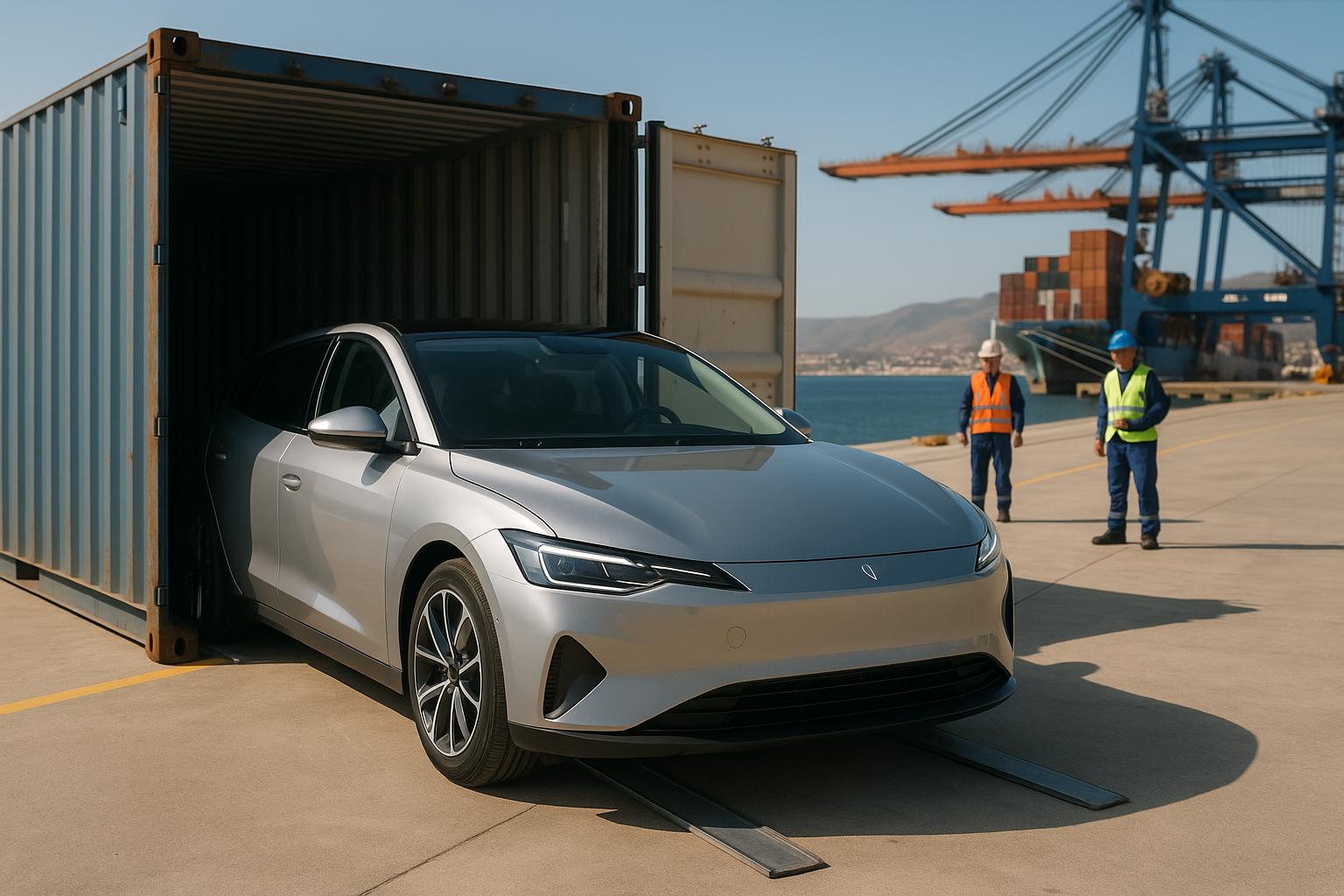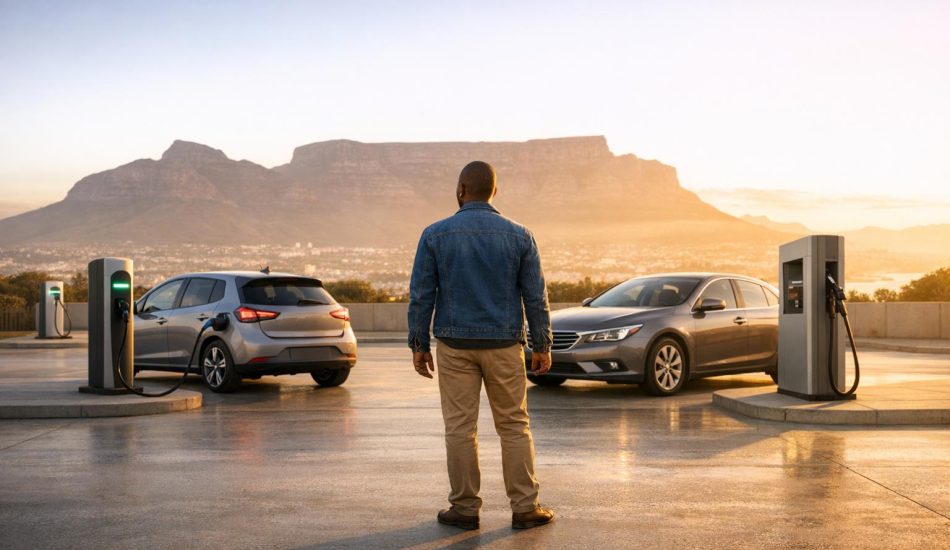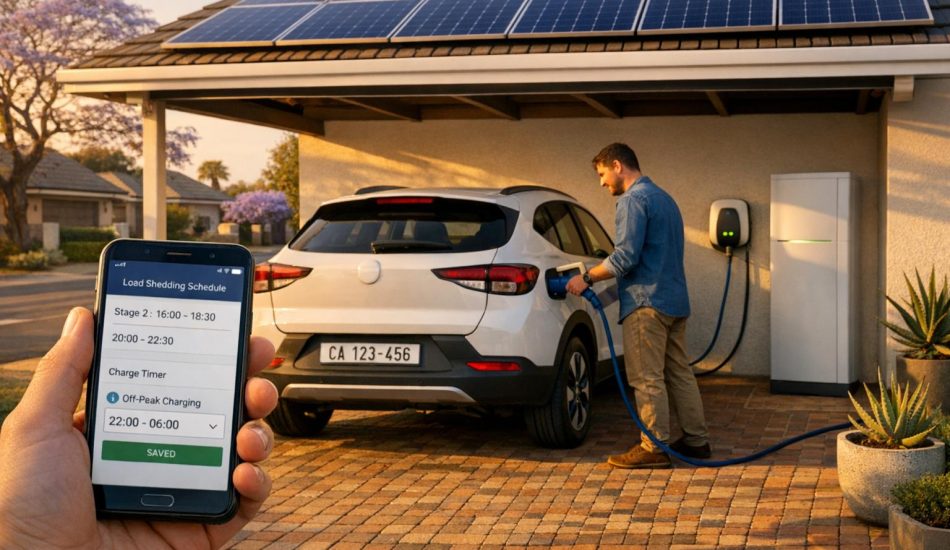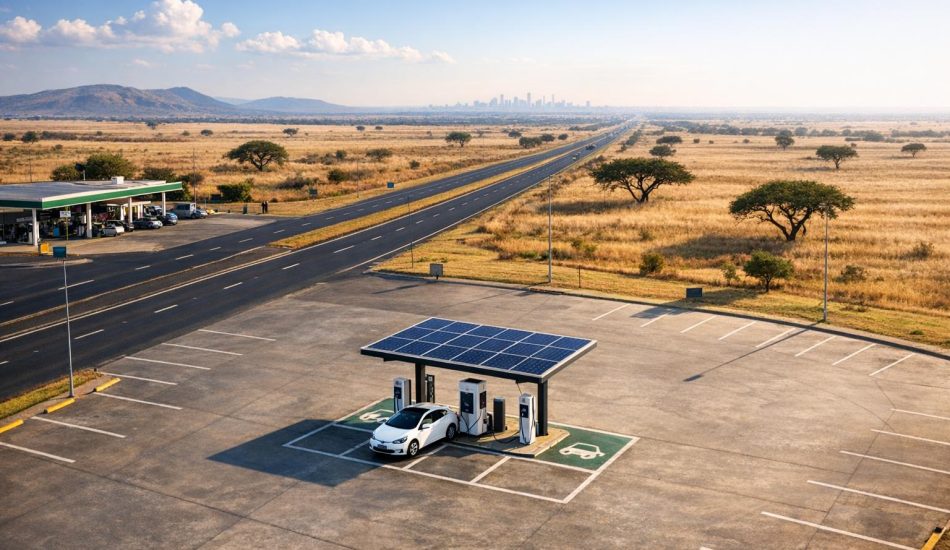
Importing electric vehicles (EVs) from China to Morocco in 2025 is a step-by-step process that requires understanding regulations, costs, and logistics. Here’s what you need to know:
- Morocco’s EV Market: The country is growing as a hub for EVs, driven by government policies and renewable energy initiatives. Importing from China is attractive due to competitive pricing and advanced technology.
- Key Regulations: Only EVs manufactured within the last five years are eligible. Required documents include a Certificate of Conformity, environmental compliance certificates, and proof of charging system compatibility.
- Costs and Incentives: Qualified EVs are exempt from import duties and VAT, reducing costs significantly. For example, a $30,000 EV with $4,000 shipping costs may land at $34,835, thanks to tax exemptions.
- Shipping Options: Choose between container shipping for added protection or RoRo (Roll-on/Roll-off) for cost efficiency. Shipping from China to Casablanca takes 30–40 days.
- Steps to Import: Find a reliable supplier, manage shipping logistics, ensure compliance with Moroccan standards, and complete customs clearance.
Careful planning, accurate documentation, and working with experienced professionals can make the process smooth and cost-effective. This guide covers everything you need to navigate importing an EV from China to Morocco.
Morocco’s Next Big Auto Expansion: Electric Vehicles | Presented by AMDIE
Legal Requirements and Regulations
When importing an electric vehicle (EV) into Morocco, it’s crucial to understand the country’s regulations to ensure compliance with its quality and safety standards.
Vehicle Standards and Eligibility
Morocco has strict technical requirements for imported EVs, designed to uphold safety and environmental benchmarks. Only fully electric vehicles qualify for the maximum benefits, so it’s essential to confirm that your vehicle’s propulsion system meets this criterion.
The vehicle must also meet a minimum battery capacity (measured in kWh) to verify its electric performance. Additionally, documentation proving the compatibility of your EV’s charging system with Morocco’s infrastructure is mandatory.
Age restrictions apply to all vehicle imports, with Morocco limiting permanent imports to vehicles manufactured within the past five years. This policy helps maintain road safety, reduce emissions, and bolster the local automotive industry.
Introduced in 2020, Morocco’s Verification of Conformity (VOC) program ensures that all imported products meet local safety and quality standards. Completing this process can significantly streamline customs clearance.
Once these technical standards are confirmed, focus on gathering the required documents to ensure a smooth import process.
Documents You Need
The documentation process for EV imports requires precision, especially if you plan to benefit from tax incentives. A Certificate of Conformity (CoC) is critical, as it demonstrates that your vehicle meets Morocco’s safety and technical standards. This document is not only necessary for customs clearance but also for qualifying for EV-specific incentives.
You’ll also need environmental compliance certificates from recognized testing authorities to confirm that the vehicle meets emissions standards. Manufacturer certifications detailing the electric propulsion system, battery safety, and technical specifications are equally important.
| Document Category | Required Documents | EV-Specific Requirements |
|---|---|---|
| Ownership & Identity | Original Vehicle Title, Bill of Sale, Vehicle Registration Certificate, Valid Passport, Residence Documentation, Driver’s License | Proof of clear ownership |
| Technical Compliance | Certificate of Conformity (CoC), Environmental Compliance Certificates | Battery capacity documentation, charging system compatibility proof |
| Manufacturer Documentation | Technical specifications, Safety certifications | Electric propulsion system certifications, battery safety documentation |
For documents in languages other than Arabic or French, certified translations and notarization through diplomatic channels are required. Always retain original documents and submit certified copies to avoid losing critical paperwork during the clearance process.
If you’re a Moroccan residing abroad (MRE) and seeking special import provisions, additional documentation may be needed. This could include employment contracts, residential leases, utility bills, tax records, or consular registration certificates to establish eligibility.
Taxes and Incentive Programs
Once your documentation is ready, review Morocco’s tax and incentive structure for EVs. The country’s 2025 EV incentive program offers substantial financial savings for qualifying electric vehicles. These policies align with Morocco’s goal of sourcing over 50% of its energy from renewable resources by 2030, reinforcing its role as a leader in sustainable transportation.
Qualifying EVs incur significantly lower fees compared to conventional vehicles. For instance, an electric vehicle valued at $25,000 might only incur $200–$800 in fees, while a comparable conventional car could face $8,000–$13,750 in taxes and duties. This translates to savings of roughly $7,200–$12,950.
For a $30,000 EV with $4,000 shipping costs, meeting all technical requirements could result in a total landing cost of $34,835. This estimate includes $85 in parafiscal tax and $750 in additional fees, assuming full exemption from import duties and VAT due to proper documentation and eligibility.
To maximize these incentives, ensure all required documents are in order. This includes the Certificate of Conformity, detailed battery specifications, charging system documentation, environmental compliance certificates, and manufacturer certifications. Before finalizing your purchase and shipment, confirm your vehicle’s eligibility with Moroccan customs authorities or consult an experienced shipping broker.
How to Import an EV: Step-by-Step Process
Importing an electric vehicle (EV) involves a few key steps: finding a trustworthy supplier, managing shipping logistics, and completing customs clearance. Here’s how to navigate the process.
Finding a Reliable Supplier
In 2023, China became the world’s largest automobile exporter, shipping 5.26 million vehicles, including 1.2 million new energy vehicles sold globally. This makes China a prime source for EVs, but choosing the right supplier is crucial.
Start by asking potential suppliers for certifications like CE and ISO to ensure product quality. It’s also wise to confirm their experience with exports to North Africa, especially Morocco, as this ensures familiarity with local documentation and regulations. Established manufacturers with a proven track record in the region are often a safer choice. Don’t hesitate to request customer references and complete technical documentation.
Good communication is key. Opt for suppliers who respond promptly and understand the specific requirements for importing EVs into Morocco. Be sure to discuss warranty terms, after-sales support, and the availability of spare parts in Morocco or nearby regions.
When requesting a Proforma Invoice (PI), be clear about your preferred trade terms. Decide whether you want FOB (Free on Board), CIF Casablanca (Cost, Insurance, and Freight), or CFR (Cost and Freight) terms, as these will shape your overall costs and responsibilities.
Once you’ve secured a reliable supplier, the next step is handling shipping logistics.
Shipping and Logistics
Most EVs are shipped from major Chinese ports like Shanghai, Ningbo, Shenzhen, Tianjin, Qingdao, and Guangzhou to Casablanca Port in Morocco. The journey typically takes 30 to 40 days by sea, with customs clearance and registration adding one to two more weeks.
Before shipping, ensure the EV’s battery charge is below 65%, and turn off the main power supply. Take clear photos documenting the battery level and chassis number. The vehicle should also have its VIN displayed on the windshield and indicate whether it’s fully electric, hybrid, or plug-in hybrid. Additionally, the shipper must provide a Material Safety Data Sheet (MSDS) for the car battery to meet safety requirements.
To avoid delays, clean the vehicle’s undercarriage thoroughly.
| Shipping Method | Cost Range | Transit Time | Best For | Key Advantages |
|---|---|---|---|---|
| Container Shipping (FCL) | $3,500 – $4,500 per vehicle | 30–40 days | High-value EVs, non-running vehicles | Maximum protection; option to include spare parts |
| RoRo (Roll-on/Roll-off) | $2,800 – $3,800 per vehicle | 35–42 days | Running vehicles, bulk orders | Cost-effective; reliable schedules; efficient loading |
Container shipping provides extra protection for high-value EVs and allows room for spare parts or accessories. A 40-foot container, costing around $9,500 to $10,500, can fit up to four sedans or two SUVs. On the other hand, RoRo shipping is a budget-friendly option for operational vehicles and larger shipments.
Work with an experienced freight forwarder familiar with EV-specific requirements. Look for one offering bilingual communication (Chinese and French). They’ll handle the necessary documentation, such as the Commercial Invoice, Packing List, Bill of Lading, Certificate of Origin, and Export Customs Declaration Form. Don’t forget to purchase cargo insurance to protect against transit risks.
Customs Clearance and Delivery
Once your EV arrives, the focus shifts to customs clearance and delivery.
Customs clearance can be delayed by incomplete paperwork. Ensure all export documents are accurate and include proper translations for Moroccan customs. Your freight forwarder will submit key documents like the Commercial Invoice, Packing List, and Bill of Lading to the authorities.
Customs officials will verify the paperwork against the vehicle to ensure compliance with regulations. If you’re eligible for any EV incentive programs, you might benefit from reduced fees – check with your customs broker for details.
After clearing customs, arrange for final delivery. Your freight forwarder can help coordinate transportation from Casablanca Port to your destination. Be prepared for potential local delivery costs.
Lastly, register your imported EV with Moroccan authorities. This requires presenting all necessary documentation, including proof of customs duty payment and insurance. The exact registration steps may vary depending on local administrative processes.
sbb-itb-99e19e3
Import Costs and Budget Planning
Understanding the full range of costs is critical when navigating the import process for an electric vehicle from China to Morocco. The total expense involves much more than just the vehicle’s purchase price. Several layers of taxes and fees can significantly impact your budget, making a detailed cost analysis essential.
Cost Breakdown
Morocco’s import tax structure is cumulative, meaning each fee is calculated based on the total that includes previous charges. This compounding effect can drive up costs, so accurate budgeting is a must.
- Vehicle Purchase Price: This is the starting point for all other cost calculations. Ensure you account for the complete acquisition cost to avoid surprises later.
- Customs Duties: For conventional gasoline and diesel vehicles, import duties range between 10% and 17% of the declared customs value. However, qualified electric vehicles are typically exempt from these duties.
- Value Added Tax (VAT): A 20% VAT is applied to the customs value of the vehicle plus any applicable import duties.
- Additional Fees: These include a Parafiscal Tax of approximately 0.25% of the vehicle’s taxable value and Administrative Processing Fees. For conventional vehicles, processing fees usually range from $500 to $1,000, while electric vehicles often incur lower fees, typically between $200 and $800.
Here’s a quick summary of the key cost components:
| Cost Component | Conventional Vehicle | Qualified Electric Vehicle |
|---|---|---|
| Import Duty | 10% – 17% of customs value | Exempt |
| VAT | 20% on (value + duty) | Exempt |
| Parafiscal Tax | 0.25% of taxable value | 0.25% of taxable value |
| Processing Fees | $500 – $1,000 | $200 – $800 |
Keep in mind that all duties and fees must be paid in Moroccan dirhams. Be sure to factor in potential currency exchange rate fluctuations and any banking transfer fees when planning your budget.
How to Get Maximum Incentives
To make the most of Morocco’s electric vehicle incentive programs, preparation and attention to detail are key. Here’s how to ensure you maximize your benefits:
- Confirm Eligibility: Not all electric or hybrid vehicles qualify for incentives. Before committing to a purchase or shipment, verify your vehicle’s eligibility with Moroccan customs authorities or consult an experienced shipping broker.
- Work with Professionals: Collaborate with customs brokers who have expertise in Morocco’s EV incentive programs. Their knowledge can help you avoid costly errors and delays that might jeopardize your benefits.
- Avoid Assumptions: Don’t assume your EV will automatically qualify for incentives. Ensure all documentation is complete and accurate to secure the benefits.
- Strategic Timing: Incentive programs can change, so stay updated on current regulations. Make sure all paperwork is in order before your vehicle arrives to preserve your tax benefits.
Proper planning and careful execution can help you reduce costs and take full advantage of available incentives.
Tips for a Smooth Import Process
Bringing an electric vehicle (EV) from China to Morocco can be a complex process, but careful planning can save you time, money, and headaches. Here are some practical tips to help you navigate the journey without unnecessary setbacks.
Meeting All Regulations
- Start by creating a comprehensive documentation checklist. This should include the vehicle’s certificate of origin, manufacturer specifications, battery safety certifications, and any homologation documents required for Moroccan roads. Having these ready well in advance can prevent delays.
- Confirm that the EV model you’re importing complies with Moroccan safety and performance standards. Pay special attention to features like lighting, safety systems, and electromagnetic compatibility, as manufacturers often tweak models for different markets.
- If the vehicle hasn’t been approved for Moroccan roads, you’ll need to initiate the homologation process. This involves submitting technical documentation and coordinating with your supplier to meet local standards.
- Double-check all battery-related paperwork. Morocco has strict requirements for lithium-ion batteries, including UN38.3 transport certification and detailed documentation on the battery management system tailored to your EV.
Once you’ve covered the regulatory side, professional help can make the rest of the process much easier.
Working with Import Professionals
- Hire a customs broker who specializes in EV imports and understands Moroccan tax exemption programs. Request quotes and references from several brokers to find the best fit for your needs.
- Partner with a shipping agent experienced in automotive cargo. Ensure they know how to properly secure your vehicle, handle insurance, and navigate port procedures. Ideally, they should offer door-to-port service in China and liaise with Moroccan port authorities for a seamless customs process.
- For larger projects or frequent imports, consult a local legal advisor with expertise in Moroccan import laws. This can help avoid compliance issues and unexpected hurdles.
- Keep communication open with all professionals involved. Use a shared timeline to track progress, set milestones, and address potential problems before they escalate.
With the right team in place, the next step is to manage your timeline effectively for a smooth registration process.
Timeline Management and Registration
- Build a timeline that includes extra buffer time for delays, especially during peak shipping periods.
- Translate all Chinese documents into Arabic or French using certified translators before the vehicle arrives. This will save you time during the registration process.
- Research the specific registration requirements for your city or province in Morocco. Fees and procedures can vary, so contact the local registration office to get a clear understanding of what’s needed.
- Use your shipping agent’s tracking system to monitor the shipment and stay in touch with your customs broker. This will help you coordinate the final steps efficiently.
- Prepare for payments. Moroccan customs requires fees to be paid in Moroccan Dirhams (MAD), so arrange for currency exchange ahead of time. Be ready to pay any immediate fees upon customs clearance.
Conclusion
Bringing electric cars from China to Morocco in 2025 presents a chance to reduce costs while tapping into advanced EV technology. However, success hinges on strict adherence to regulations, accurate documentation, and thorough preparation.
It’s not just about meeting legal requirements – execution matters. Make sure the EV models comply with Moroccan safety standards, customs rules, and battery certifications to avoid complications.
Plan your budget wisely. While upfront costs like shipping, customs duties, and other fees might seem steep, tax exemptions and incentives can significantly ease the financial burden. Don’t forget to factor in potential currency fluctuations between the Chinese Yuan (CNY) and Moroccan Dirham (MAD).
The timeline for importing depends on your chosen shipping method and customs processing. To avoid disruptions, build flexibility into your schedule and maintain open communication with brokers and suppliers.
With Morocco’s growing electric vehicle market and charging infrastructure, 2025 is a promising year for EV imports. Whether you’re bringing in a single vehicle or a fleet, careful planning and expert guidance can pave the way for a smooth and cost-effective process. By following the outlined steps – from sourcing to customs clearance – you’ll be well-positioned to embrace the future of electric mobility in Morocco.
FAQs
What challenges might arise when importing an electric car from China to Morocco, and how can they be addressed?
Importing electric cars from China to Morocco comes with its fair share of hurdles. Among the key challenges are high import taxes, complex customs procedures, a lack of widespread charging infrastructure, and financing issues. These factors can make the process seem overwhelming, but with the right approach, they can be navigated effectively.
One way to tackle these challenges is by looking into tax incentives or simplified import processes that might be available. Building relationships with trustworthy suppliers and logistics companies can also go a long way in reducing complications. When it comes to charging infrastructure, keep an eye on government or private sector projects aiming to expand Morocco’s network. Lastly, offering creative financing options, such as leasing programs or installment plans, could make electric vehicles more affordable and appealing to potential buyers.
How can I ensure the electric car I’m importing complies with Moroccan safety and environmental regulations?
To make sure your imported electric car aligns with Moroccan safety and environmental standards, it needs to undergo a technical inspection at an official service des mines center. Once the vehicle successfully meets all the required criteria, you’ll receive a Moroccan conformity certificate.
This certificate serves as proof that your car complies with local regulations, a crucial step for finalizing the import process and registering the vehicle in Morocco. Be sure to collect all the needed paperwork and check with the inspection center for any specific guidelines or additional requirements.
How can I make sure I qualify for the maximum tax benefits when importing an electric car into Morocco?
When bringing an electric car into Morocco, you can take advantage of significant tax breaks if the vehicle is fully electric. These cars qualify for a 0% VAT rate and are entirely exempt from customs duties.
To ensure a smooth process, always review the most recent regulations and confirm that all necessary paperwork is accurate and up to date. This extra step can save you from potential delays or complications during customs clearance.




